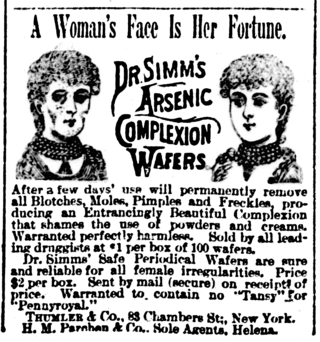
False advertising is the act of publishing, transmitting, or otherwise publicly circulating an advertisement containing a false claim, or statement, made intentionally to promote the sale of property, goods, or services. A false advertisement can be classified as deceptive if the advertiser deliberately misleads the consumer, rather than making an unintentional mistake. A number of governments use regulations to limit false advertising.
Online advertising, also known as online marketing, Internet advertising, digital advertising or web advertising, is a form of marketing and advertising that uses the Internet to promote products and services to audiences and platform users. Online advertising includes email marketing, search engine marketing (SEM), social media marketing, many types of display advertising, and mobile advertising. Advertisements are increasingly being delivered via automated software systems operating across multiple websites, media services and platforms, known as programmatic advertising.
A regulatory agency or independent agency is a government authority that is responsible for exercising autonomous dominion over some area of human activity in a licensing and regulating capacity.

The Committee of Advertising Practice (CAP) is a British organisation responsible for the UK Code of Non-Broadcast Advertising, Sales Promotion and Direct Marketing, which is the main code of practice for self-regulation of the non-broadcast advertising industry in the UK.
BBB National Programs, an independent non-profit organization that oversees more than a dozen national industry self-regulation programs that provide third-party accountability and dispute resolution services to companies, including outside and in-house counsel, consumers, and others in arenas such as privacy, advertising, data collection, child-directed marketing, and more. The Center for Industry Self-Regulation (CISR) is BBB National Programs' 501(c)(3) non-profit foundation. CISR supports responsible business leaders in developing fair, future-proof best practices, and the education of the public on the conditions necessary for industry self-regulation.

The Advertising Standards Authority (ASA) is the self-regulatory organisation of the advertising industry in the United Kingdom. The ASA is a non-statutory organisation and so cannot interpret or enforce legislation. However, its code of advertising practice broadly reflects legislation in many instances. The ASA is not funded by the British government, but by a levy on the advertising industry.
Advertising to children refers to the act of advertising products or services to children as defined by national laws and advertising standards.
The Advertising Standards Authority (ASA) is an organisation that investigates breaches of advertising standards in New Zealand. The ASA provides a free complaints process for consumers about the content and placement of advertisements. In assessing complaints, the ASA apply the ASA Advertising Codes. Key requirements of these codes include truthful presentation and a sense of social responsibility. If a complaint is upheld, the ASA formally request the advertisement is removed or amended. Decisions are released to the media and the public via email and online.
Ad Standards is the advertising industry's non-profit self-regulating body created in 1957 to ensure the integrity and viability of advertising in Canada. The organization's members include major advertisers, advertising agencies, media organizations, and suppliers to the advertising sector. Some of the activities that the organization engages in are:
Ad Standards manages the complaint resolution process of the advertising self-regulation system in Australia.
The Children’s Advertising Review Unit (CARU) is a U.S. self-regulatory organization that was established in 1974 and is administered by BBB National Programs. It is an independent self-regulatory agency for the promotion of responsible advertising and privacy practices to children under the age of 13 in all media. CARU reviews and evaluates child-directed media for truth, accuracy, appropriateness, and sensitivity to children’s still developing cognitive abilities in accordance with its Self-Regulatory Guidelines for Children's Advertising, privacy guidelines, and relevant laws.
The NAI (Network Advertising Initiative) is an industry trade group founded in 2000 that develops self-regulatory standards for online advertising. Advertising networks created the organization in response to concerns from the Federal Trade Commission and consumer groups that online advertising — particularly targeted or behavioral advertising — harmed user privacy. The NAI seeks to provide self-regulatory guidelines for participating networks and opt-out technologies for consumers in order to maintain the value of online advertising while protecting consumer privacy. Membership in the NAI has fluctuated greatly over time, and both the organization and its self-regulatory system have been criticized for being ineffective in promoting privacy.
The Australian Association of National Advertisers (AANA) is the national body for advertisers based in Sydney, Australia. The AANA represents the interests of organisations involved in Australia’s advertising, marketing and media industry.

IMS Unison University (IUU), formerly Institute of Management Studies, is a private university located in Dehradun, Uttarakhand, India. It offers academic programs at under-graduate, post-graduate and doctoral levels in different streams of management, mass communication, law, hospitality management and liberal arts.
AdChoices is a self-regulatory program for online interest-based advertising that exists in the United States, Canada and across Europe. The program calls for advertising companies to establish and enforce responsible privacy practices for interest-based advertising, aimed to give consumers enhanced transparency and control. Companies adhere to a set of principles that are enforced by accountability programs.

The Advertising Standards Authority (ASA), previously known as the Advertising Standards Authority for Ireland, is the self-regulatory organisation (SRO) for advertising industry in Ireland. The 7th edition of its Code was introduced with effect from March 2016. Some of the activities that the organization engages in are:
TV advertisements by country refers to how television advertisements vary in different countries and regions.
Biswaroop Roy Chowdhury is a self-proclaimed doctor known for sharing medical conspiracy theories, including denialist conspiracies about COVID-19, HIV/AIDS, and diabetes, for which he has been heavily criticized and his claims have been widely discredited. Chowdhury's multiple YouTube and social media accounts have been terminated for spreading misleading health advice.

Advertising Board of the Philippines (Adboard) was an advertising trade association in the Philippines. Founded in 1974, it served as a centralized self-regulatory body for the country's advertising industry until its closure of operations in 2014.

The Ad Standards Council (ASC) is a regulatory body of the advertising industry in the Philippines.







